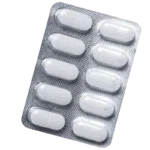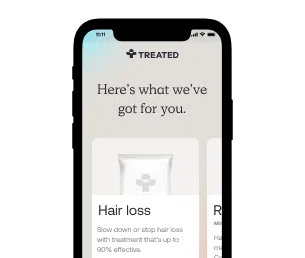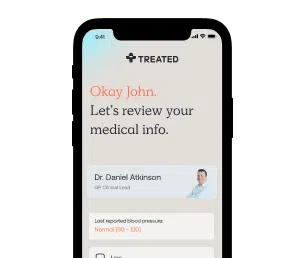Rosacea
Capsules, creams and gels for redness and irritation.
Secure delivery
UK clinicians
Rosacea is a skin condition that mainly affects the facial area, and is mainly characterised by redness of the skin. It can be long term and tends to be more common in women and people with fair skin.
Answer a few questions about your health, and get recommendations for treatment from our experts. Order Rosacea online, on subscription.
Rosacea is a chronic inflammatory skin condition, mostly affecting the facial areas of the cheeks, chin, nose and central part of the forehead. It can cause various symptoms, mainly redness of the skin, visible blood vessels on the face and in some cases small, pus-filled bumps. But sometimes a tingling or burning sensation accompanies this, along with dryness of the skin and some swelling.
Anyone can develop rosacea, although it is generally more common in people over 45, women, and people who have fair skin.
Although the exact prevalence of rosacea is unknown, worldwide studies suggest that just over 5% of the adult population is affected. Both men and women are affected by it, but the proportion of women who get rosacea is slightly higher. It mostly affects men and women in the 45-60 age bracket.

How we source info.
When we present you with stats, data, opinion or a consensus, we’ll tell you where this came from. And we’ll only present data as clinically reliable if it’s come from a reputable source, such as a state or government-funded health body, a peer-reviewed medical journal, or a recognised analytics or data body. Read more in our editorial policy.
Although the exact cause is not known, various factors are believed to contribute towards or cause rosacea. It may be simply down to skin type (genetics), as rosacea may run in some families, such as those with photosensitive skin types. Exposure to the elements, like the sun, for example, is also seen as a risk factor, along with increasing age.
It’s also thought that a tiny mite (demodex folliculorum) which lives harmlessly on the skin of many people and usually produces normally harmless bacteria, is understood to be more prevalent if you’re more prone to rosacea.
With different people there is often a specific stimulus or trigger which may include the following:
There are various symptoms associated with rosacea. Some or all may be experienced, with the severity and duration varying greatly from person to person and even episode to episode. The first symptom you’ll normally get is redness (blushing) across your nose, forehead, cheeks and chin, which may come and go. This may be accompanied by a burning or stinging sensation, especially when washing or using skincare products. On darker skin this redness may be harder to see.
Other symptoms may include:
Usually rosacea doesn’t cause any serious complications. But if it affects the eyes, it can become serious without treatment. On very rare occasions, a particularly serious form of rosacea forms, called fulminans, which can produce large cysts which may cause permanent scarring.
Rosacea is often misdiagnosed as eczema, and the longer it’s undiagnosed and untreated, the more serious it can become.

How we source info.
When we present you with stats, data, opinion or a consensus, we’ll tell you where this came from. And we’ll only present data as clinically reliable if it’s come from a reputable source, such as a state or government-funded health body, a peer-reviewed medical journal, or a recognised analytics or data body. Read more in our editorial policy.
Although rosacea cannot be cured there are a range of treatments available to help with treatment and control symptoms. Left untreated, it can become worse over time. These treatments include both topical (applied) creams or gels and oral medication such as antibiotics. On occasion you may also be prescribed IPL (intense pulsed light) treatment.
There isn’t a ‘best’ treatment for rosacea as such, as this will depend on the type, severity and duration of symptoms that you have, as well as your own specific treatment preferences.
Rosacea is not caused by poor hygiene and it’s not contagious, but there are things you can do to try to help with symptoms. If you know that there is a certain trigger which results in rosacea or makes your symptoms worse, such as spicy foods or alcohol, then try to avoid it as much as possible. If the sun causes a reaction, take steps to reduce exposure and/or wear a sunscreen that’s at least factor 30.
In cold weather, you should take steps to cover your face. And if you use skincare products, use treatments that are specifically for sensitive skin.
Always try to maintain good physical health and mental wellbeing alongside a healthy balanced diet, too. If a particular trigger exposes you to stress induced rosacea, then take steps to reduce or eliminate this where possible. This way you may be able to avoid future episodes without the need for any treatment.

How we source info.
When we present you with stats, data, opinion or a consensus, we’ll tell you where this came from. And we’ll only present data as clinically reliable if it’s come from a reputable source, such as a state or government-funded health body, a peer-reviewed medical journal, or a recognised analytics or data body. Read more in our editorial policy.
Have something specific you want to know? Search our info below, or ask our experts a question if you can’t find what you’re looking for.
Incidence and prevalence of rosacea: a systematic review and meta-analysis. British Journal of Dermatology. vol. 179, no. 2. pp. 282-289.
Rosacea: What are the risk factors? [Accessed 2 Nov. 2021].
Rosacea: Overview. Cologne, Germany: Institute for Quality and Efficiency in Health Care.
Safety and efficacy of doxycycline in the treatment of rosacea. Clinical, Cosmetic and Investigational Dermatology. p.129
Soft retinol capsules for severe rosacea. Generic version of Roaccutane.

Versatile treatment for acne, rosacea and skin infections. Available in two strengths.

Effective antibiotic for rosacea and bacterial acne. Clearer skin, on subscription.

Registered with GMC (No. 4624794)
Meet Daniel
Registered with GPhC (No. 2202465)
Meet Sanjeda
Registered with GPhC (No. 2070724)
Meet Craig
Always read the leaflet that comes with your medication and tell us about any side effects you get.
We know health, but you know you.
Our experts tell you what’s safe, but you decide what’s best.
Answer a few questions and tell us about yourself. Get tailored advice from our clinicians so you can choose better.

Choose your treatment and how often you have it delivered.

We know things change. It’s the nature of life. We’ll check in regularly to make sure your treatment is still right for you.
Pause. Change. Skip. Start again. Any time you like.
Here are some other things we can help with.
Choose from our range of tablets and solutions. Get ongoing care and support from our experts.
Stop smoking treatments that can help you kick the habit forever, and reduce your risk of disease.
Tablets or injections. Tailored weight loss treatments combined with ongoing support from our experts.
We're making healthcare more about you. Sign up to our newsletter for personalised health articles that make a difference.
Disclaimer: The information provided on this page is not a substitute for professional medical advice, diagnosis, or treatment. If you have any questions or concerns about your health, please talk to a doctor.
We couldn't find what you're looking for.
Here's everything we treat. Or, if you're looking for something we don't have yet, you can suggest something.
If there’s a particular treatment or condition you’re looking for, tell us and we’ll look into it for you.
Submit your question here, or tell us if you’ve found an issue on our site.
We’ll get back to you very soon. We aim to respond to all queries in one working day.
You’re signed up to our newsletter. Keep an eye on your inbox for our latest update.
By clicking 'Subscribe now' you're agreeing to our Privacy Policy.
We’ve sent you an email asking you to confirm your email address.